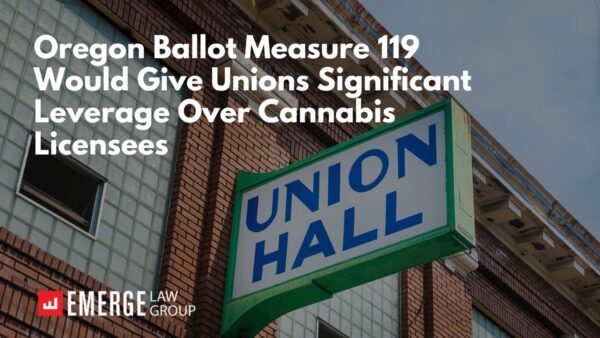CannaBeat is a curated biweekly selection of top news stories impacting business, research, and culture in the cannabis industry, crafted by Emerge Law Group.
Emerge’s Hot Take
New York Cracks Down on Unlicensed Pot Shops, but Closing Them Might Take Time
As the release of updated cannabis licensing regulations approaches, New York authorities have re-upped efforts to weed out unlicensed shops. Legislation signed into the state budget in May allows for inspections, seizures, fines, and possible shop closure for those retailers operating without a license. Additionally, pursuant to a measure passed by the City Council last week, New York City may now levy new fines against the landlords of illegal retail dispensaries.
Currently, there are only 15 licensed retailers who have opened shops in New York State – with a population of nearly 20 million, this leaves a large market for unlicensed shops to exploit, creating a dearth of competition for retail licensees. Beyond the sheer abundance of unauthorized shops, there is an ongoing concern among licensed shop owners that consumers lack a clear understanding of the difference between a licensed and unlicensed dispensary beyond just licensure. Key differences cited focus on the safety and consistency of product, due in part to mandatory lab testing and labeling requirements for licensees. Further, some licensed retailers donate portions of their profits to nonprofit philanthropic organizations. These selling points are overshadowed in the current market by the number of unlicensed shops operating in close proximity to licensees. Emerge East’s Stephanie Algarin Santiago echoes this concern. “Regulated products are subject to heightened requirements that ensure consumers’ safety. But unfortunately, consumers have no way of telling these storefronts apart.”
Despite heightened legislation, a noticeable decline in unlicensed shops may not be immediately seen. State officials are careful to avoid the recriminalization of marijuana, and there are several steps between inspection and seizure and complete closure of a business – for example, all retailers are entitled to an administrative hearing to determine if and how much they’ll be fined. Nevertheless, licensees generally consider the new regulations to be a step in the right direction, with some licensed dispensaries already reporting the apparent closure of unlicensed shops in their area.
“Ultimately, what matters most is not if the OCM shuts these shops down, it’s when,” says Algarin Santiago. “The longer the illicit shops remain open, the more they will affect the up-and-coming regulated market. By escaping regulatory and tax requirements, these shops are experiencing all the advantages and none of the burdens that come from selling adult-use cannabis in New York. The OCM is certainly better equipped to handle the situation now, but the damage done will require them to restore faith in the city’s regulated market.”
Other Noteworthy News
Major Marijuana Industry Players Launch Super PAC To Advance Cannabis Reform As 2024 Election Heats Up
“A coalition of marijuana businesses and advocacy groups has launched a new super PAC that will work to ‘raise the profile of cannabis as a national issue in the 2024 election and beyond.’ The U.S. Cannabis Council (USCC) announced on Wednesday that it and its member businesses have formed the “Legalize America” super PAC, which unlike traditional political action committees can accept contributions of any size but cannot directly coordinate with political candidates. Despite public support for ending marijuana prohibition, the coalition says that Congress ‘is stuck in the past,’ so the super PAC ‘will help speed up the nation’s transformation on cannabis reform.’ It will seek to achieve that goal through a combination of partnerships with ‘high-profile public figures and brands,’ and will also look into working with cannabis stakeholders to see if they’d be willing to give customers an option to ‘round up’ their purchases, with the extra change going to the campaign as donations. Right now, Legalize America’s membership overlaps with that of USCC, which counts among its partners ATACH, Canopy Growth, Columbia Care, Curaleaf, Cresco Labs, Cronos Group, Dutchie, Houseplant, Marijuana Policy Project, PAX, PharamCann, Scotts Miracle-Gro and Vicente, among others. It’s already become clear that drug policy will be a prominent issue in the 2024 presidential election, with Republican and Democratic candidates weighing in on marijuana reform early in the race.”
Nevada Issues First Cannabis Consumption Lounge Licenses
“Cannabis regulators in Nevada have issued the state’s first three conditional licenses for cannabis consumption lounges. The Nevada Cannabis Control Board (CCB) issued two licenses for businesses in the Las Vegas Valley, while the remaining permit was issued for a lounge to be located in Washoe County in the northwestern corner of Nevada. Before they can invite guests in to light up, the three Nevada businesses must first receive local approval and undergo a final inspection by board agents with the CCB. But with their conditional licenses in hand after approval by the board at a meeting on June 20, the lounges can finish planning and constructing their sites and prepare for opening. Planet 13 vice president of sales and marketing David Farris said that the company is still in the planning and construction phase for its lounge. Neither Planet 13 nor Thrive Cannabis Marketplace, the second business to receive a cannabis consumption lounge in Clark County, have set an expected opening date. Thrive hopes to open its lounge on Sammy Davis Jr. Boulevard in time for the MJ Biz Con cannabis industry trade show in late November.”
Maryland Marijuana Legalization Takes Effect This Weekend, With Sales Set To Launch As Governor Recommits To Equity Goals
“Maryland’s marijuana legalization law officially takes effect on Saturday, with simple possession and personal cultivation set to become legal as the majority of existing medical cannabis dispensaries prepare to open their doors to adult consumers for the first time. Meanwhile, ahead of the launch, the governor is reaffirming his commitment to fostering an industry that puts equity first. Nearly 100 dispensaries have been approved by state regulators to covert to dual licensees that will be able to serve patients and adult consumers over the age of 21 alike. They will be authorized to sell to both groups starting July 1, when legalization takes effect under a ballot measure approved by voters last year. Lawmakers have worked expediently to ensure that the industry infrastructure is put into place in tandem with the legalization of simple possession and home cultivation. In addition to the 94 medical cannabis dispensaries that have been approved for adult-use sales so far, the Maryland Cannabis Administration (MCA) announced earlier this month that it has approved 38 cultivators and manufacturers to supply the new market. Under the referendum that voters approved in November, legalization of possession of up to 1.5 ounces of cannabis takes effect on Saturday—with an additional removal of criminal penalties for possession of up to 2.5 ounces.”
Two Cannabis Farms Hit With Recall Over State’s Controversial Aspergillus Testing Requirements
“The Oregon Liquor and Cannabis Commission recalled batches of weed from two farms Monday because it tested positive for aspergillus, a ubiquitous fungus that festers in natural environments. [T]he agency implemented the new testing rules March 1. Growers feared that such testing—which looks for a fungus common at farms, especially those that are organic—would cripple the industry. This week’s recall of seven batches of weed from a farm owned by Nectar and one batch from a Eugene farm called Rebel Spirits was met with fury. The guild in particular takes issue with the manner in which the agency recalled cannabis from the farms. In anticipation of the new aspergillus tests, the OLCC encouraged farms last winter and early this year to take aspergillus tests that, the CIAO says, would not be used for compliance purposes but would instead help the agency and the industry get a sense of what percentage of products would fail the test. Jesse Bontecou, executive director of the Cannabis Industry Alliance of Oregon, says members of the industry were assured by the OLCC that such tests prior to the March 1 implementation of the new rules would not be held against farms. But Bontecou says results from those early tests were used by the OLCC to recall the cannabis batches announced on Monday. While the OLCC acknowledges that research and development tests were not to be used for compliance purposes, the agency felt it could not overlook the test failures it detected while doing a routine audit of the state’s cannabis tracking system.”
Subscribe
Subscribe to CannaBeat to receive essential weekly articles on news, business, and culture in the cannabis industry, delivered straight to your inbox.
CannaBeat by Emerge Law Group
CannaBeat is a weekly brief on news, business, and culture in the cannabis industry curated by members of Emerge Law Group's distinguished Cannabis Industry Group.





